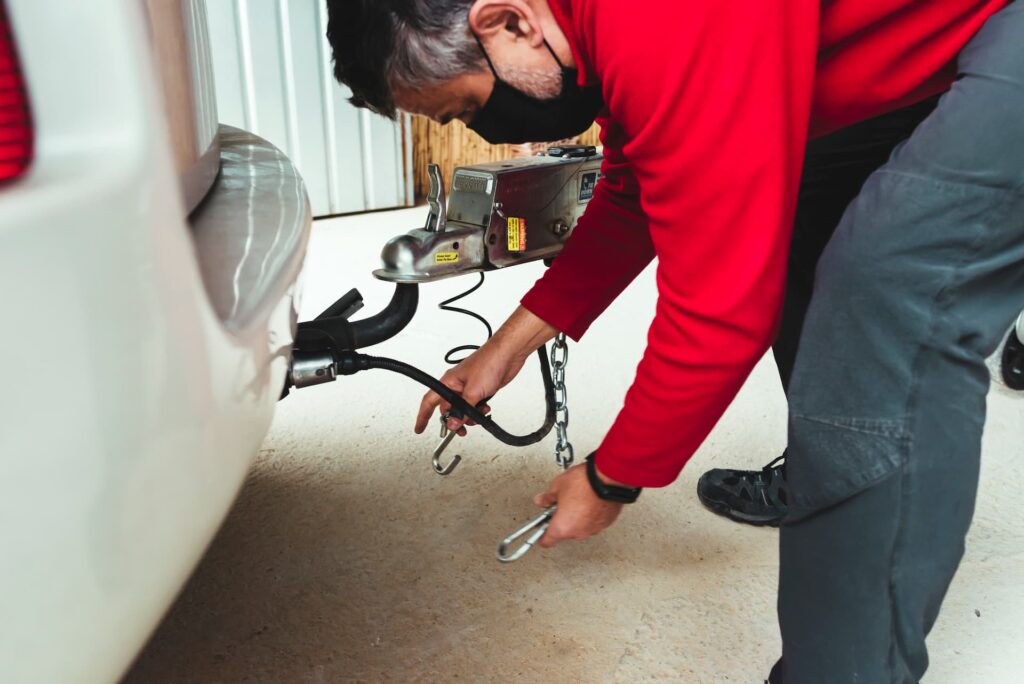A recent Auburn University study reported, “On average, more than one person a day dies in the United States from towing-related accidents –many of which occur because of driver inexperience.” Additionally, some disasters occur simply due to lack of proper tow equipment and vehicle preparedness. Summer is winding down. Maybe you’re planning that last family boat trip or completing a DIY move for your new college freshman? Follow some of these towing tips to ensure you are not the one clogging up the busy boat ramp or sitting jack-knifed on the side of the road in Florida’s blistering heat.
Towing Tips to Get You Sailing and Hauling Safely
Start with an equipment check.
Not sure what all is entailed? No need to trouble yourself with the dealer, a trusted local auto repair shop like Cassels Garage in Melbourne can give you a quick assessment covering:
- Lights – blinkers, tail, side, brake and hazard lights, and reflectors.
- Transmission Check — the two major causes of damage to the transmission from towing are inadequate fluids and carrying heavier weight than your vehicle is rated to tow.
- Tires — trailer tires should be the same type and size. Always remember to have a spare trailer tire, maybe even two, as blowouts are common when towing. Tow vehicle tires should be in their best shape, properly inflated, and regularly checked throughout your trip.
- Brakes — depending on the weight of your load, type of vehicle tasked with towing, road terrain (hills or winding highways), and precipitation, you may need a breakaway switch and separate braking system. Always be sure the brakes are engaged when loading or unloading the trailer.
Hitch should fit properly and specifically.
A comprehensive tow package includes a coupler, hitch or tow ball, and the hitch itself.
- Coupler: the hitch ball and coupler must be the same size as the coupler is responsible for securing the trailer to the vehicle.
- Hitch: the hitch attaches to the vehicle and is the conduit (the connection) between the vehicle and the trailer.
- Hitch Ball (aka) Tow Ball: attaches to the coupler to secure the trailer to the vehicle.
Which type of hitch is best?
Trailers are often perceived to be light weight, and many are. However, the weight of a fully loaded trailer really dictates what type of hitch is necessary. While receiver type hitches are used most, there are others that may be more suitable for your needs.
- Fifth wheel and goose neck hitches are often used for heavier loads such as horse trailers, recreation vehicles, and popular toy haulers. These hitches are embedded into the bed of a truck.
- Front mount tow hitches are mounted to the front of the vehicle (trucks, vans, or SUVs) providing extra space for items such as coolers, BBQ grills, additional suitcases, or crates.
- Fixed tongue hitches are not removable, they are permanently installed to the vehicle whether you are towing or not.
- Custom hitches are specially designed for your vehicle’s make, model, and year. You’ll need a good understanding of the weight and towing capacity of your vehicle before investing in a custom hitch.
Are safety chains required when towing?
Safety chains provide peace of mind for novice and experienced towers. If the coupler or hitch ball become disconnected, without safety chains, your vehicle may keep going while your trailer is left behind, potentially impeding traffic, causing accidents, injuries, and property damage. The safety chains keep the trailer attached to the vehicle. Be sure the chains are securely connected under the trailer tongue, crisscrossed, have some slack, but not enough slack to drag on the roadway.
Know your hitch rating.
This is critical to ensuring your vehicle can accommodate the weight of a fully loaded trailer whether its livestock, a boat, or your four-wheelers. Here is a quick guide:
Gross Trailer Weight (GTW) is the weight of your trailer when loaded fully in the condition which it will be towed.
| CLASS | LOAD CAPACITY | GROSS TRAILER WEIGHT (GTW) |
|---|---|---|
| Class I: | 2,000 pounds | Lighter loads |
| Class II: | 3,500 pounds | Lighter loads |
| Class III: | 5,000 pounds | Heavier loads such as campers, boats, etc. |
| Class IV: | 7,500 pounds | Heavier loads such as campers, boats, etc. |
| Class V: | 10,000+ pounds | Very heavy loads |
Lightening and securing your boat.
When towing a boat, it is advisable to invest in a winch to make pulling the vessel onto your trailer easier. Draining containers of water such as the live well will lighten your load somewhat. Depending on the size, two or more ratchet-type straps should be used to secure the boat.
Step up basic driving practices while towing.
- Give your brakes a break by slowing or stopping gradually. You’ll need additional room when braking to account for the added weight and any adverse road or weather conditions.
- Allow for additional space for your fellow drivers in front of and behind you.
- Double-check that your mirrors are positioned properly given the extra length you are towing and the possibility of greater blind spots.
- Be mindful of your speed and avoid sharp corrections to your steering which can cause the trailer to sway, swerve, or jackknife.
- Make wider turns giving your wheels and tires extra space to avoid rubs or riding over curbs.
- Be alert to react quickly. Limit distractions, no texting or impairments while driving, allow for extra time to your destination as at some point you will likely need to drive below the posted speed limit.
Prepare Your Vehicle for Towing a Boat or Towing a Trailer at Cassels Garage
Americans are increasingly hauling boats and trailers for personal lifestyle use. In the past, towing was mostly comprised of workers in the construction, farming, and ranching industries. If you’re towing the family camper or a boat for a fishing or recreational trip with friends, you likely will have passengers. It is critical that you ensure your vehicle is ready for the added stress from towing by having an assessment completed by professionals.
You can find those professionals at Cassels Garage which provides superior car repair service in Melbourne, FL, and the surrounding areas. Making sure engine, transmission, and differential fluids are topped off or replaced as needed, and brake fluids and brake pads are ready for the job are just a few of Cassels Garage specialty vehicle maintenance services. Call today for an assessment and they’ll have you on your way sailing or hauling successfully.





